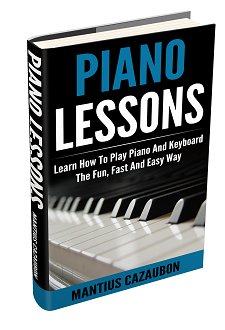Buying Used Piano Tips & Guide
Buying Used Piano - Tips and Guide
Used pianos are sometimes better than new ones. The 1920 were marked by pianos of the highest quality. But a word of caution must be sounded. Before buying a used piano, seek the advice of a professional technician, or buy from a reputable piano dealer. There's often a fine line between a good deal and a piece of junk. Only a tuner-technician is suitably qualified to tell you whether a used piano is worth buying.
Highly Recommended: Go here for the BEST piano/keyboard course I’ve seen on the Internet.
Before buying a used piano, ask the seller why they're selling it. Pay attention to the answer given. Answers like, "it's taking up space", or "I could use the money" might mean that the piano has been neglected. If the seller doesn't have money it could mean that they haven't been spending money on maintenance. Ask them whether they will be buying another piano and why is the other one better than the one they're selling.
Ask the seller how often the piano was tuned. Ask them whether the tuning schedule was consistent. Pianos must be tuned at least twice a year, otherwise you will soon have to pay for special tunings and related maintenance.
I would advise against buying a piano that is out of tune. An out-of-tune piano may have serious internal issues or it may not be tunable at all.
Ask the seller who performed maintenance on the piano. Was the piano tuned by some guy down the street for $30, or was it by a qualified professional? If the tuner wasn't qualified, he may have made some serious errors and caused internal damage that will cost you later on.
Find out where the piano was being stored. Beware of a piano which has been kept in a public storage facility or a basement. The lack of climate-control, temperature extremes and humidity fluctuations may have damaged the piano's health.
Inspect a used piano rigorously. Perhaps much more thoroughly than you would if it were a new piano. Play every key with the right hand pedal depressed so as to get a true impression of the tone. The keyboard, hammers, and pedals shouldn't squeak. Are the hammers and strings in good condition? Is there rust and dirt?
Check the keys for looseness. Place your finger on the front of a key and move it from left to right and vice versa. It shouldn't move more than 1/16" in either direction. Pay particular attention to the middle keys since they are played most often.
You can even ask who the previous owner was. A serious pianist would usually take better care of his instrument.
Find out how old the piano is.
The brand name and serial can be used to trace the piano's age. Be wary of pianos that are more than 20 years old. Pianos age far more quickly than other strung instruments like violins and guitars. Their strings create a lot of stress on soundboards, bridges, and pin-blocks. Pianos have lots of mechanical parts unlike violins and guitars, and mechanical parts wear out as they are used.
But while age is important, your primary focus should be its condition. Compare the used piano with similar pianos. Make a new price comparison based on resale market value.
Before buying a used piano make sure that you can pay for the piano itself, plus regular maintenance starting with its first tuning. This would be between one and two months after buying.
If the piano appears not to have been abused and is of a good price you can probably leave a deposit subject to approval by a technician. If you're working with your tuner find out whether he or she is also a technician. Some tuners are not technical and have no real knowledge of the mechanical system of pianos.
The technician may be able to tell you the approximate value of the piano in its current condition, as well as the estimated cost of repairs, if any. Based on your knowledge, you may then choose to offer the seller a price.
For comprehensive information on buying a piano, check out The Piano Book: Buying & Owning a New or Used Piano.
Search This Site:

Recommended For You
Learn to play piano and keyboards:
Click here to learn how to play keyboards and piano (with Piano For All).
Go here to buy a Yamaha keyboard.
Check out How To Read Music Fast: A 4-Step Beginner's Guide To Reading Music Quickly And Easily.





New! Comments
Have your say about what you just read! Leave me a comment in the box below.